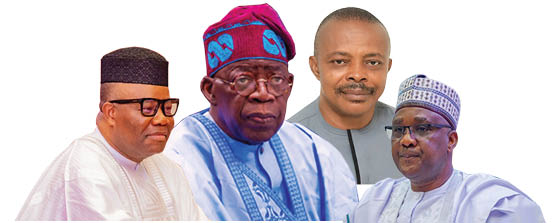The ongoing dispute between the Federal Government and the Labour Union raises stakeholders’ concerns. Of particular note is the state governors’ recent decision to reject the Federal Government’s proposed offer, SUNDAY MONDAY writes.
In Nigeria’s current political landscape, governors find themselves at a crossroads as they confront a contentious deadlock over minimum wage adjustments amidst heightened social unrest.
The issue of revising the minimum wage has become a focal point of debate, with state governors and labour unions locked in a stalemate that threatens to exacerbate existing societal tensions.
At the heart of this impasse lies the demand for a significant increase in the minimum wage to address inflationary pressures and the rising cost of living, juxtaposed against governors’ concerns over fiscal sustainability and economic viability.
Whilst the Federal Government is offering Labour N62,000 which State Governors have kicked against with claims that they can’t pay it, the Labour union is demanding N250,000 as minimum wage.
It will be recalled that, at the last sitting of the Tripartite Committee on minimum wage in Abuja, both the government side and representatives of the private sector had made a final offer of N62,000 while organised labour represented by NLC and Trade Union Congress (TUC) came down from their earlier demand of N594,000 to N250,000.
Minister of Budget and Economic Planning, Atiku Bagudu, said lean resources were responsible for governors’ rejection of the N62,000 minimum wage.
He said: “The constitution has made provision to guide the President to send legislation to the National Assembly periodically on issues of minimum wage for the best outcome.
“The Tinubu administration wants all Nigerians to be skilled as its priority under a skill-based economy where the people, including workers, can earn millions of naira
“The President intends to make Nigerians more prosperous with cheap housing, cheap food, cheap transport, and availability of structures for national growth and development.
“President Tinubu and Governor Nasir Idris of Kebbi State are doing the very best to improve the living conditions of the people in all sectors of life, I commend and congratulate them on the occasion of the Eid-el Kabir.’’
On his part, Bukar Goni Aji, Chairman of the Tripartite Committee established by the Federal Government on National Minimum Wage, asked Labour to reconsider the amount it demanded as minimum wage.
He listed some of the government incentives as reasons why the labour should reconsider its decision on the minimum wage and accept the N62,000 offered by the government, against its demand of N250,000.
He also cited the N185 billion palliatives loans to states to cushion the effects of fuel subsidy removal and N200 billion to support the cultivation of hectares of land to boost food production.
He said there is another N75 billion to strengthen the manufacturing sector and N1 trillion for student loans for higher education.
He cited the release of 42,000 metric tonnes of grains from strategic reserves and the purchase and onward distribution of 60,000 metric tonnes of rice to the millers’ association.
Goni urged Labour to consider the recent salary increase of 25 percent and 35 percent on all consolidated salary structures for federal workers and the 90 percent subsidy on health costs for federal civil servants registered on the health insurance programme and accept the N62,000 being offered by the Federal Government.
He listed the N35,000 wage award for all treasury-paid federal workers, N100 billion for procurement of gas-fuelled buses and conversion to gas kits, the N125 billion conditional grant, financial inclusion to small and medium scale enterprises, and the N25,000 each to be shared to 15 million households.
This notwithstanding is the position of some state governors who have insisted that the offer of the Federal Government is not sustainable.
Nigeria’s federal structure grants state governors considerable autonomy in managing their respective economies, yet this decentralisation has led to a patchwork of varying wage scales across the country.
While some states have shown readiness to implement wage hikes to appease their workforce and quell discontent, others argue that such increases could strain already stretched budgets, potentially leading to layoffs or reduced public services.
The standoff has not only underscored economic disparities among states but also highlighted broader socio-political fault lines. In states where wage increments have been delayed or denied, protests and strikes have erupted, adding pressure on governors to find a swift resolution. The resultant public unrest has further strained relations between state authorities and their constituents, deepening distrust in governance and fueling a sense of disillusionment.
Moreover, the timing of this deadlock is critical as Nigeria navigates a delicate period of post-recession recovery and grapples with global economic uncertainties. The outcome of these negotiations will not only shape the immediate economic landscape but also influence public sentiment ahead of upcoming electoral cycles.
As governors weigh their options, the need for a balanced approach that considers both economic sustainability and social equity remains paramount. Finding common ground through constructive dialogue and inclusive decision-making processes will be essential to defusing tensions and charting a path toward equitable economic growth.
Labour insist on N250,000
Speaking, one of Labour’s negotiators in the Tripartite Committee tasked the chairman to urge the government to make its offer reflect the economic conditions and the cost of living faced by workers
He said: “We have carefully considered the chairman’s appeal for organised labour as represented by the Nigeria Labour Congress, NLC, and Trade Union Congress of Nigeria, TUC, to take into account the prevailing economic realities in the ongoing national minimum wage negotiations with the federal government and the organised private sector.
“We understand the complexity of the economic situation. However, it is imperative to address several critical points that underpin our stance.
“The call for NLC and TUC to consider economic realities is, at best, a reflection of a limited understanding of the actual hardships faced by Nigerian workers. The nationwide survey we conducted delineates the stark economic realities for the average Nigerian family.
“The cost of living has escalated dramatically, driven by governmental policies that have led to increased prices of petrol, higher electricity tariffs, and a significant devaluation of the naira.
“Our demand for a national minimum wage of N250,000 is not arbitrary but firmly grounded in the economic realities dictated by the current market prices of essential goods and services.
“The prices of basic commodities have skyrocketed, and the purchasing power of the average Nigerian worker has been severely eroded. It is crucial to recognize that Labour’s demand is based on comprehensive data reflecting the true cost of living in Nigeria today.
“We may wish to remind the chairman that a bag of 50kg Rice is about N80,000, a decent tuber of yam is about N7,000; garri is N3,500 for half paint bucket, bread is N2,000 per loaf, meat is about N6,000/kg, oil is about N2,000/75L, electricity is about N50,000/month, while transport is about N3,000 daily to and from Gwagwalada to Berger in Abuja and N4, 000 from Ipaja to Lagos Island etc.
“The chairman should know that our wages are supposed to meet these basic needs and others and these are some of the realities that he asked us to base our demands on which we have done since the beginning of the negotiation exercise.
“It is rather disappointing that the government’s offer appears disconnected from these market realities. When we requested a breakdown of what constitutes the government’s offer, the response was not forthcoming.
‘’This lack of transparency suggests that the government is perhaps aware that its offer does not meet the basic economic needs of Nigerian workers, thereby undermining its credibility. Perhaps, the government may be ashamed of the paltriness of the offer it is making to Nigerian workers, thus it is too heavy for them to mention.
“We urge you to redirect your advice towards the government to be realistic in its approach to this negotiation. The government’s offer should reflect the actual economic conditions and the cost of living faced by workers.
“It is not the NLC that is being unrealistic; rather, it is the government’s offer that fails to align with the economic dictates of the marketplace. A realistic and fair minimum wage must be grounded in the current economic realities, which our demand of N250,000 though falls short of what we had intended but accurately represents realities at this time. As it is, we have considered more than enough.
“We wish the government will at least show the kind of willingness to sacrifice that we have exhibited and reciprocate. Good leaders make sacrifices for the citizenry. They must give up on some of their security votes, their luxury yacht, convoys, private jets, and other creatures of comfort so that Nigerian workers and people can benefit.
“We plead with the chairman to urge the government to be realistic and refuse the temptation to seek to pay a starvation wage to Nigerian workers. Our nation must not be destroyed so that the few individuals in government will continue to live in opulence while workers and citizens suffer.
“We reiterate that the NLC’s position is driven by a deep understanding of the economic hardships faced by Nigerian workers, as substantiated by our nationwide survey.
“We stand firm in our demand for N250,000 as the national minimum wage and urge the government to present a realistic offer that genuinely reflects the cost of living and the dignity of Nigerian workers. ‘’We call upon the Tripartite National Minimum Wage Negotiation Committee Chairman to advocate fairness and transparency in this critical wage-setting exercise. The resources of our nation need to be equitably and fairly distributed for national development.”
Stakeholders react
The Minister of Works and Housing of Nigeria, Babatunde Fashola, clarified the distinction between salary and wages, emphasizing that they are often conflated but serve different purposes. He pointed out that salaries are typically paid monthly and apply to white-collar workers, whereas wages are paid hourly to blue-collar workers on factory floors.
Fashola underscored that the current review pertains to salaries, not wages, contrary to what the Constitution addresses. He highlighted that setting a monthly minimum salary, as opposed to an hourly minimum wage, poses different implications for workers and businesses alike. He cautioned that while increasing the minimum wage is crucial for vulnerable workers, it could also lead to challenges, particularly for higher-ranking officials who would also expect salary adjustments.
Fashola suggested a need for a more comprehensive approach to ensure that businesses, especially smaller enterprises, can adapt without undue financial strain. He noted the importance of calculating the minimum wage per hour to accurately reflect its economic impact, emphasizing that the current approach to setting a monthly minimum salary may not fully address the broader implications of wage adjustments across different sectors and income levels.
Meanwhile, Former Governor of Ekiti State, Kayode Fayemi suggested that each state government should independently decide what they can afford to pay as a minimum wage.
Concerned about the plight of workers, Governor Charles Soludo of Anambra State said governors and other elected government officials in Nigeria should earn minimum wage to feel the pains of workers in the country.
This is as he warned President Tinubu against approving an ‘unsustainable’ minimum wage.
“The minimum wage thing, everybody is right. The worker is right to say, ‘What am I getting?’ Nobody is asking what a worker does. We are not asking that question yet. All we are saying is: ‘How much does he need?’ He (the worker) is right, and for me, even if we pay N1 million, it’s not enough.
“But on the other hand, you have to come back to reality; talking about these MSMEs, the schools, churches, and so on. You will have to pay your driver. We are all in it. Whatever they agree, we will muddle through but maybe after one year, we will need to meet to discuss the consequences.
“I pity the President because it will all be on his head if the consequences come down, whatever it is if whatever is negotiated is unsustainable or payable. Months to come, who will bear the responsibility? Not me.”
Tinubu To Send New Minimum Wage Bill To NASS
President Bola Ahmed Tinubu emphasized that Nigeria would implement a new minimum wage that aligns with the country’s financial capacity while hinting at a possible adjustment to the final amount.
Addressing the Senate President and Deputy Senate President, he assured them of prompt notification if there were any changes to his stance on the minimum wage. He stressed the need to tailor expenditures to fit available resources, stating, “We’re going to do what Nigeria can afford, what you can afford, what I can afford. They ask you to cut your coat according to your size.”
Furthermore, Tinubu conveyed that an executive bill on the new national minimum wage will soon be presented to the National Assembly for approval. “In this spirit,” he remarked, “we have engaged in sincere negotiations with Organised Labour to establish a new national minimum wage. We will submit an executive bill to the National Assembly to codify the agreed terms into law for the next five years or less.”
Regarding the recent national strike by Labour on June 3, 2024, Tinubu highlighted that none of the leaders from the Nigeria Labour Congress (NLC) and the Trade Union Congress (TUC) were subjected to arrest or threats. Instead, he noted, they were invited to engage in constructive dialogue aimed at reaching a mutually beneficial resolution. Tinubu underscored that such reasoned discussions and principled compromises are essential components of a democratic society.
Acknowledging the economic challenges faced by Nigerians, Tinubu expressed empathy and pledged to undertake the necessary measures to revitalize the economy.
 National Telescope national telescope newspaper
National Telescope national telescope newspaper




